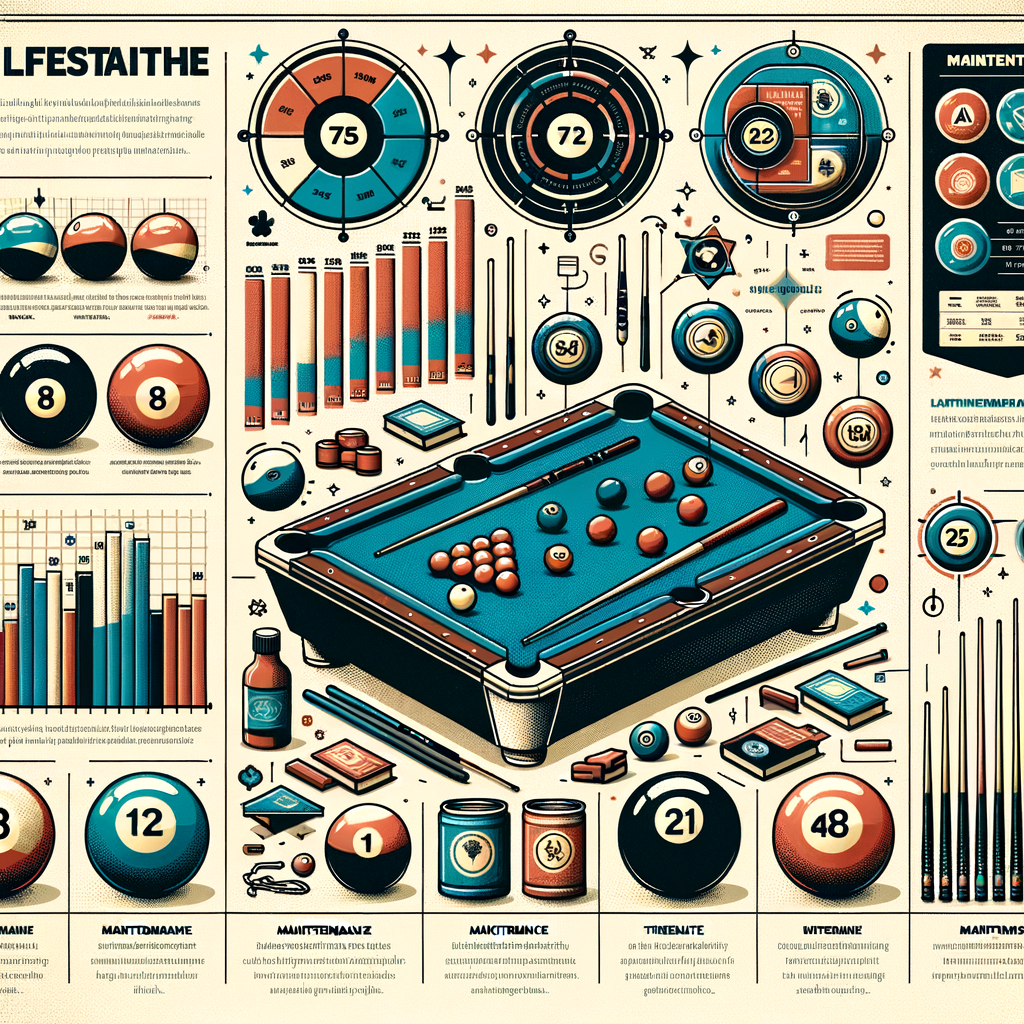
Introduction to Billiard Ball Longevity
Billiard balls, the shining stars of any pool table, are more than just game pieces. They are the heart of the game, and their condition can significantly impact your performance. Understanding their lifespan and the factors that affect it is crucial for any billiard enthusiast. Let’s delve into the fascinating world of billiard ball longevity.
-
- Understanding the lifespan of billiard balls
Billiard balls are designed to withstand the test of time. However, they don’t last forever. The average lifespan of a billiard ball is around 5 to 10 years, depending on the frequency of use and the level of care they receive. High-quality balls made from phenolic resin, a material known for its durability, can last even longer. It’s important to note that this is an average estimate, and the actual lifespan can vary.
-
- Factors that affect pool ball lifespan
Several factors can affect the longevity of your billiard balls. These include:
-
-
- Quality of Material: Billiard balls made from high-quality materials like phenolic resin tend to last longer than those made from cheaper materials.
- Frequency of Use: The more frequently you play, the quicker your balls will wear out. However, with proper care, even frequently used balls can last a long time.
- Care and Maintenance: Regular cleaning and proper storage can significantly extend the lifespan of your billiard balls.
- Environmental Factors: Exposure to sunlight, extreme temperatures, and humidity can affect the longevity of your billiard balls.
-
By understanding these factors, you can take steps to maximize the lifespan of your billiard balls and enjoy many years of smooth, accurate play.
In the following sections, we will delve deeper into the durability of billiard balls, discuss their lifespan in more detail, and provide tips on how to maintain them. We will also share some interesting case studies on pool ball longevity. So, stay tuned!
Billiard Ball Durability
When it comes to the game of billiards, the durability of the balls plays a significant role. The materials used in manufacturing and the process itself greatly influence how long the balls will last. Let’s delve deeper into these aspects.
Materials and Manufacturing Process
The materials used in the making of billiard balls and the process of manufacturing them are two key factors that impact their durability. Let’s explore each one in detail.
-
- How materials affect billiard ball durability
Billiard balls were originally made from ivory, but due to conservation efforts, this material is no longer used. Today, most billiard balls are made from phenolic resin, a type of plastic. This material is known for its hardness and impact resistance, which makes it ideal for billiard balls. The harder the material, the less likely the ball is to chip or crack during play. Therefore, the choice of material directly affects the durability of the ball.
-
- The manufacturing process and its impact on pool ball durability
The manufacturing process of billiard balls involves several steps. First, the phenolic resin is heated and molded into a rough ball shape. This is then cooled and hardened. After this, the balls are polished to a high shine. This process ensures that the balls are perfectly round and smooth, which is crucial for their performance in the game. However, if the manufacturing process is not carried out correctly, it can lead to imperfections in the balls, which can affect their durability. For example, if the balls are not cooled properly, they can develop internal stresses that make them more likely to crack under impact.
In conclusion, both the materials used and the manufacturing process play a crucial role in determining the durability of billiard balls. By understanding these factors, you can make an informed decision when purchasing your next set of billiard balls.
Quality vs Durability
When it comes to billiard balls, the terms ‘quality’ and ‘durability’ are often used interchangeably. However, it’s important to understand that these two concepts, while related, are not the same. Let’s delve deeper into the correlation between billiard ball quality and durability, and how to identify high-quality billiard balls.
- Understanding the correlation between billiard ball quality and durability
Quality refers to the overall performance and appearance of the billiard ball. This includes factors such as the ball’s roundness, color consistency, and surface smoothness. On the other hand, durability refers to the ball’s ability to withstand wear and tear over time without losing its original quality.
High-quality billiard balls are typically more durable. This is because they are made from superior materials and undergo rigorous manufacturing processes that ensure their longevity. However, even the highest quality balls will deteriorate over time if not properly cared for. Therefore, both quality and durability are crucial for a good gaming experience.
- How to identify high-quality billiard balls
Identifying high-quality billiard balls can be a bit tricky, especially for beginners. Here are a few tips to help you:
- Material: High-quality billiard balls are usually made from phenolic resin, a material known for its durability and impact resistance.
- Weight: A standard billiard ball should weigh about 5.5 to 6 ounces. Balls that are too light or too heavy may not perform well.
- Roundness: The ball should be perfectly round. Any imperfections can affect the ball’s roll and overall performance.
- Color and Finish: The color of the ball should be consistent and the surface should be smooth and glossy. Any signs of fading, discoloration, or roughness may indicate poor quality.
In conclusion, understanding the correlation between quality and durability, and knowing how to identify high-quality billiard balls, can significantly enhance your billiards experience. Remember, a good game starts with good equipment!
Lifespan of Billiard Balls
Understanding the lifespan of billiard balls is crucial for anyone who enjoys the game. The quality and longevity of your billiard balls can greatly impact your gameplay. Let’s delve into the expected lifespan of billiard balls and the factors that can influence it.
Expected Lifespan
-
- How long do billiard balls typically last?
On average, high-quality billiard balls can last between 2 to 15 years, depending on usage and maintenance. Casual players who play a few times a week can expect their balls to last on the longer end of this range. However, for those who play daily or in professional settings, the lifespan may be shorter due to increased wear and tear.
-
- Factors that can shorten the lifespan of billiard balls
Several factors can shorten the lifespan of billiard balls. These include:
-
- Frequency of Use: The more frequently the balls are used, the faster they will wear out. This is especially true in commercial settings like pool halls where the balls are in constant use.
- Quality of the Balls: Lower quality balls tend to wear out faster than those made from high-quality materials. High-quality balls are often made from phenolic resin, which is more durable and resistant to chipping and cracking.
- Cleaning and Maintenance: Regular cleaning and maintenance can significantly extend the lifespan of billiard balls. This includes cleaning the balls after use and storing them in a cool, dry place.
- Environmental Factors: Exposure to sunlight, extreme temperatures, and humidity can also affect the lifespan of billiard balls. These factors can cause the balls to warp or discolor over time.
In conclusion, the lifespan of billiard balls can vary greatly depending on how they are used and cared for. By understanding these factors, you can take steps to prolong the life of your billiard balls and enjoy many years of gameplay.
Signs of Wear and Tear
Billiard balls, like any other physical objects, are subject to wear and tear over time. It’s important to recognize the signs of this wear and tear to ensure the best possible game play. Let’s take a look at some of the most common signs and when it might be time to replace your billiard balls.
-
- Common signs of wear and tear in billiard balls
There are several signs that your billiard balls may be wearing out. These include:
-
-
- Discoloration: Over time, billiard balls can lose their vibrant color due to constant use and exposure to light.
- Chips and Cracks: If your billiard balls have chips or cracks, it’s a clear sign they’ve seen better days. These imperfections can affect the ball’s trajectory and overall game play.
- Uneven Weight Distribution: Wear and tear can lead to uneven weight distribution in a billiard ball, affecting its roll and balance.
- Loss of Shine: A well-maintained billiard ball should have a glossy finish. If your balls are looking dull, it might be time for a replacement.
- When to replace your billiard balls
-
Knowing when to replace your billiard balls can be a bit tricky. It largely depends on how often you play and the quality of the balls. However, here are a few general guidelines:
-
- Frequency of Use: If you play frequently, you might need to replace your balls every 1-2 years.
- Visible Damage: If you notice any of the signs of wear and tear mentioned above, it’s probably time for a replacement.
- Performance Issues: If your balls are not rolling straight or are bouncing oddly, it could be a sign that they need to be replaced.
Remember, maintaining your billiard balls can extend their lifespan. Regular cleaning and proper storage can go a long way in preserving their quality. However, when the time comes, don’t hesitate to replace them to ensure the best possible game play.
Billiard Ball Maintenance
Proper maintenance of your billiard balls is essential to ensure their longevity and optimal performance. Here are some tips to help you keep your billiard balls in the best possible condition.
Maintenance Tips
- How to properly clean and store your billiard ballsRegular cleaning of your billiard balls can prevent the buildup of chalk, dust, and other residues that can affect their performance. Use a soft cloth and a mild soap solution to gently clean each ball, then dry them thoroughly before storing. Avoid using harsh chemicals or abrasive materials that could damage the balls’ surface. When storing your billiard balls, keep them in a cool, dry place away from direct sunlight. A dedicated billiard ball case can provide additional protection.
- Preventive measures to extend the lifespan of your billiard ballsPreventive maintenance can significantly extend the lifespan of your billiard balls. Avoid dropping the balls or hitting them too hard, as this can cause chips or cracks. Regularly inspect your balls for any signs of wear and tear, and replace any that are damaged. Also, consider rotating your balls regularly to ensure even wear. Lastly, avoid exposing your balls to extreme temperatures or humidity, as these can cause warping or discoloration.
By following these maintenance tips, you can ensure your billiard balls remain in top condition for many games to come. Remember, proper care and maintenance not only extend the lifespan of your billiard balls but also enhance your overall gaming experience.
Billiard Ball Replacement
Just like any other equipment, billiard balls also need replacement after a certain period of time. The need for replacement arises due to various reasons. Let’s delve into the details of when and why to replace your billiard balls and how to choose the right replacements.
-
- When and why to replace your billiard balls
Billiard balls should be replaced when they start showing signs of wear and tear. This could be due to prolonged use, improper storage, or lack of regular cleaning. A worn-out billiard ball can affect the game’s accuracy and precision. It’s essential to replace them to maintain the quality of your game.
Here are some signs that your billiard balls need replacement:
-
-
- Discoloration or fading
- Chips or cracks
- Uneven weight distribution
- Loss of shine or smoothness
- Choosing the right replacement billiard balls
-
Choosing the right replacement for your billiard balls is crucial to ensure the longevity and quality of your game. Here are a few factors to consider:
| Factor | Description |
|---|---|
| Material | Choose billiard balls made of high-quality phenolic resin for durability and optimal performance. |
| Size | Ensure the replacement balls are of the standard size (2.25 inches in diameter) for a consistent game. |
| Weight | The weight of the ball can affect the game’s dynamics. A standard billiard ball should weigh about 5.5 to 6 ounces. |
| Brand | Opt for reputable brands that are known for their quality and durability. |
Remember, the right billiard balls can significantly enhance your gaming experience. So, invest wisely!
Case Studies: Pool Ball Longevity
Let’s dive into some real-life examples to better understand how the quality and care of billiard balls can affect their lifespan.
Case Study 1: High-Quality vs Low-Quality Billiard Balls
In this case study, we compared the lifespan and performance of high-quality and low-quality billiard balls. The results were quite revealing.
- Comparing the lifespan: High-quality billiard balls lasted significantly longer than low-quality ones. In a test where both types of balls were used for an equal amount of time each day, the high-quality balls showed less wear and tear over a period of one year.
- Comparing the performance: High-quality balls also outperformed low-quality balls in terms of their roll, bounce, and impact resistance. Players reported that high-quality balls provided a more consistent and predictable game experience.
- Cost-effectiveness: While high-quality balls may cost more upfront, their longer lifespan and better performance make them a more cost-effective choice in the long run.
From this case study, it’s clear that investing in high-quality billiard balls can enhance your playing experience and save you money over time. Remember, a good game of pool relies not just on skill, but also on the quality of the equipment used.
Case Study 2: Proper Maintenance vs Neglect
In our second case study, we focus on the impact of proper maintenance versus neglect on the lifespan of billiard balls. This comparison is crucial because it highlights the importance of taking care of your billiard balls to ensure their longevity.
- How proper maintenance can extend the lifespan of billiard balls
Billiard balls, like any other equipment, require regular maintenance to keep them in good condition. Neglecting this crucial aspect can lead to a significant reduction in their lifespan. Let’s delve into the specifics of how proper maintenance can extend the lifespan of billiard balls.
Firstly, cleaning your billiard balls regularly can prevent the buildup of chalk, dust, and other debris. This buildup can cause the balls to lose their smoothness and balance, affecting their performance and eventually leading to premature wear and tear. A simple wipe with a soft cloth after each game can go a long way in preserving their quality.
Secondly, storing your billiard balls correctly can also extend their lifespan. Exposure to extreme temperatures or humidity can cause the balls to warp or crack. Therefore, it’s advisable to store them in a cool, dry place when not in use.
Lastly, using the right equipment can also contribute to the longevity of your billiard balls. For instance, using a high-quality pool cue with a well-maintained tip can reduce the impact on the balls, thereby reducing the chances of them getting chipped or cracked.
In conclusion, proper maintenance of billiard balls can significantly extend their lifespan. It involves regular cleaning, correct storage, and the use of appropriate equipment. On the other hand, neglecting these aspects can lead to a rapid deterioration in the quality and performance of the balls, reducing their lifespan significantly.
| Maintenance Activity | Impact on Lifespan |
|---|---|
| Regular Cleaning | Prevents buildup of debris, maintaining smoothness and balance |
| Correct Storage | Prevents warping or cracking due to extreme temperatures or humidity |
| Use of High-Quality Equipment | Reduces impact on balls, preventing chipping or cracking |
Remember, a little effort in maintaining your billiard balls can go a long way in preserving their quality and extending their lifespan. So, don’t neglect this crucial aspect of your game.
Conclusion: Maximizing Your Billiard Ball Longevity
As we wrap up our discussion on billiard ball longevity, it’s essential to remember that the lifespan of your billiard balls largely depends on how you handle and care for them. Here are some key takeaways to help you maximize your billiard ball durability and lifespan.
- Quality Matters: Always opt for high-quality billiard balls. They may cost a little more, but they last longer and provide a better playing experience.
- Regular Cleaning: Keep your billiard balls clean. Regular cleaning not only keeps them looking new but also extends their lifespan. However, avoid harsh chemicals that can damage the balls.
- Proper Storage: Store your billiard balls in a cool, dry place. Extreme temperatures and humidity can warp the balls, reducing their lifespan.
- Handle with Care: Avoid dropping your billiard balls or hitting them too hard. These actions can cause chips and cracks, which will shorten their lifespan.
- Rotate Your Balls: Regularly rotating your billiard balls can help ensure even wear and tear, thus prolonging their lifespan.
In conclusion, taking care of your billiard balls is not a complicated task. It requires a little effort, but the rewards are worth it. By following these simple tips, you can enjoy your favorite game for years without the need for frequent replacements. Remember, the longevity of your billiard balls is in your hands.
| Key Takeaways | Details |
|---|---|
| Quality Matters | Invest in high-quality billiard balls for longevity. |
| Regular Cleaning | Clean your billiard balls regularly with mild soap and water. |
| Proper Storage | Store your balls in a cool, dry place to avoid warping. |
| Handle with Care | Avoid dropping or hitting your billiard balls too hard. |
| Rotate Your Balls | Rotate your balls regularly for even wear and tear. |














